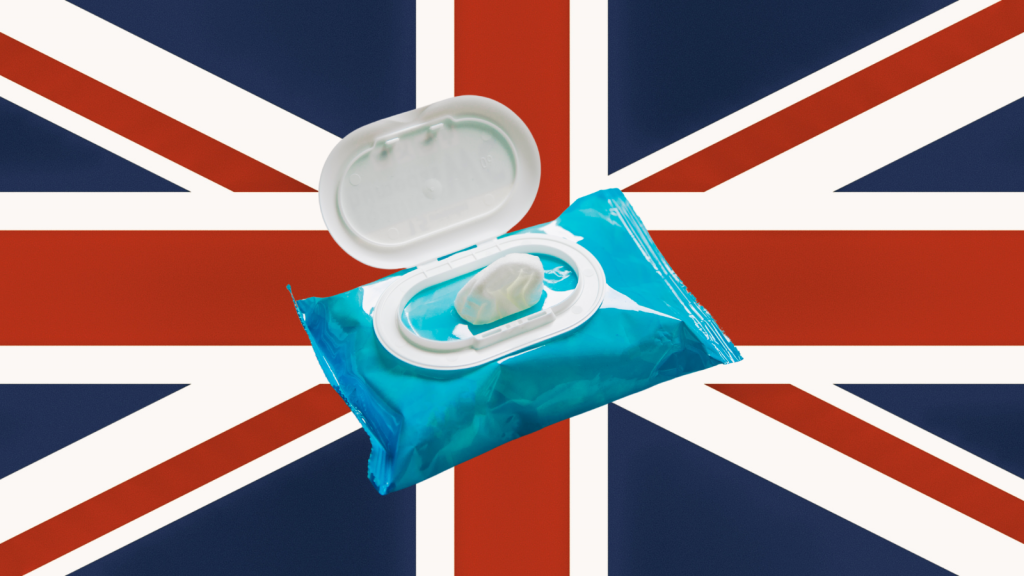In a landmark move to combat plastic pollution, the UK Government has announced its intention to ban wet wipes containing plastic. This world-leading legislation is set to be introduced this year (2024), marking a significant step towards cleaner waterways and a healthier environment.
The Problem with Wet Wipes
Wet wipes have become an everyday convenience for many, used for everything from personal hygiene to cleaning surfaces. However, those containing plastic pose severe environmental threats. Over time, these wipes break down into microplastics, which persist in the environment and cause numerous problems.
Research shows these microplastics can harm human health and disrupt ecosystems. Alarming findings from a recent survey revealed an average of 20 wet wipes per 100 meters of beach surveyed across the UK, highlighting the scale of the issue.
When flushed down toilets, wet wipes can accumulate biological and chemical pollutants, increasing the risk of harm to both wildlife and humans. The build-up of these materials in waterways and wastewater treatment facilities exacerbates the problem, leading to blocked pipes and contaminated beaches.

The Ban: A Step Towards a Cleaner Future
In response to overwhelming public support, the UK Government will introduce new legislation to ban the supply and sale of wet wipes containing plastic. This decision follows a public consultation where 95% of respondents agreed or strongly agreed with the proposed ban. The legislation will be introduced in England ahead of the 2024 summer recess, with Northern Ireland, Scotland, and Wales following suit by the autumn, ensuring a unified approach across the UK.
The ban will be enacted through secondary legislation under the Environmental Protection Act 1990, demonstrating the government’s commitment to tackling plastic pollution. This move builds on previous successful initiatives, such as the single-use carrier bag charge and the ban on microbeads in personal care products.
Benefits of the Ban
Banning plastic-containing wet wipes will significantly reduce plastic and microplastic pollution, thereby enhancing the quality of our waterways and beaches. By preventing these products from entering wastewater treatment sites and natural water bodies, the ban will help protect marine life and human health from the harmful effects of microplastics.
Additionally, the legislation will support ongoing efforts to hold water companies accountable for environmental protection. It will complement measures such as increased investment in water infrastructure, stricter penalties for pollution, and more frequent inspections of water company sites.
Industry Response and Transition
The government has set an 18-month transition period to allow businesses to adapt to the new regulations. This period is designed to ensure a smooth shift away from plastic-containing wet wipes, giving manufacturers and retailers ample time to adjust their production and supply chains.
Many retailers have already taken proactive steps by removing plastic-containing wet wipes from their shelves. This transition highlights the availability and effectiveness of plastic-free alternatives, which are becoming increasingly popular among consumers. The government’s ban will further accelerate this positive trend, ensuring that all wet wipes sold are environmentally friendly.
Exemptions and Future Goals
While the ban represents a significant milestone, certain exemptions will be in place where no viable alternatives exist, such as for medical disinfectant purposes. The government will regularly review these exemptions to ensure they remain necessary and to encourage the development of plastic-free alternatives in all sectors.
The UK’s move to ban wet wipes containing plastic is a crucial step towards reducing plastic pollution and safeguarding our waterways. By introducing this legislation, the government is taking decisive action to protect the environment and public health. The ban not only addresses the immediate issue of plastic pollution but also sets a precedent for future efforts to eliminate unnecessary plastic use.

